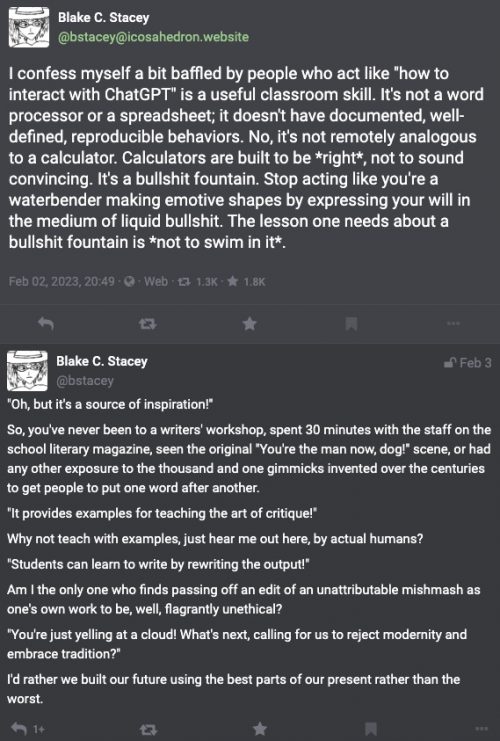A Texas A&M professor flunked all of his students because ChatGPT told him to.
Dr. Jared Mumm, a campus rodeo instructor who also teaches agricultural classes,
He legitimately wrote a PhD thesis on pig farming, but really — a “rodeo instructor”? I guess that’s like the coaches we have working in athletic programs at non-Ag colleges.
sent an email on Monday to a group of students informing them that he had submitted grades for their last three essay assignments of the semester. Everyone would be receiving an “X” in the course, Mumm explained, because he had used “Chat GTP” (the OpenAI chatbot is actually called “ChatGPT”) to test whether they’d used the software to write the papers — and the bot claimed to have authored every single one.
“I copy and paste your responses in [ChatGPT] and [it] will tell me if the program generated the content,” he wrote, saying he had tested each paper twice. He offered the class a makeup assignment to avoid the failing grade — which could otherwise, in theory, threaten their graduation status.
Wow. He doesn’t know what he’s doing at all. ChatGPT is an artificial expert at confabulation — it will assemble a plausible-sounding mess of words that looks like other collections of words it finds in its database, and that’s about it. It’s not TurnItIn, a service professors have been using for at least a decade that compares submitted text to other texts in it’s database, and reports similarities. ChatGPT will happily make stuff up. You can’t use it the way he thinks.
Mumm was unwarrantedly aggressive in his ignorance.
Students claim they supplied him with proof they hadn’t used ChatGPT — exonerating timestamps on the Google Documents they used to complete the homework — but that he initially ignored this, commenting in the school’s grading software system, “I don’t grade AI bullshit.” (Mumm did not return Rolling Stone‘s request for comment.)
Unfortunately for him, Mumm was cursed with smarter spectators to his AI bullshit. One of them ran Mumm’s PhD thesis through ChatGPT in the same inappropriate, invalid way.
In an amusing wrinkle, Mumm’s claims appear to be undercut by a simple experiment using ChatGPT. On Tuesday, redditor Delicious_Village112 found an abstract of Mumm’s doctoral dissertation on pig farming and submitted a section of that paper to the bot, asking if it might have written the paragraph. “Yes, the passage you shared could indeed have been generated by a language model like ChatGPT, given the right prompt,” the program answered. “The text contains several characteristics that are consistent with AI-generated content.” At the request of other redditors, Delicious_Village112 also submitted Mumm’s email to students about their presumed AI deception, asking the same question. “Yes, I wrote the content you’ve shared,” ChatGPT replied. Yet the bot also clarified: “If someone used my abilities to help draft an email, I wouldn’t have a record of it.”
On the one hand, I am relieved to see that ChatGPT can’t replace me. On the other hand, there is an example of someone who thinks it can, to disastrous effect. Maybe it could at least replace the Jared Mumm’s of the world, except I bet it sucks at bronco bustin’ and lassoing calves.












